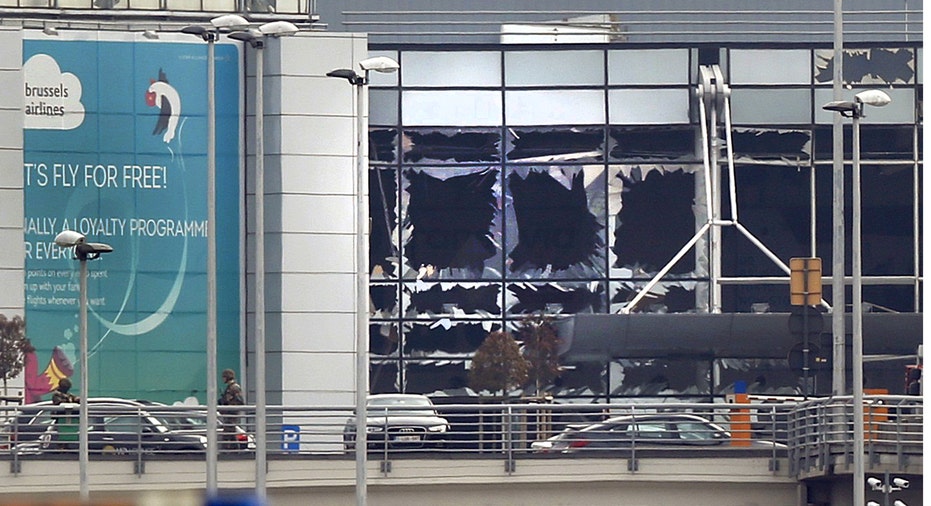Brussels Rocked by Terrorist Attacks, Death Toll Rises

Explosions rocked Brussels' international airport and a subway station near European Union institutions on Tuesday in what authorities described as terrorist attacks, killing at least 27 people and injuring many more in horrific scenes of chaos.
A suicide bomber committed the airport attack and authorities were looking into whether some attackers could be on the run, the Belgian federal prosecutor said at a news conference.
The explosions come days after the arrest of Salah Abdeslam, one of the alleged Paris attackers who was captured in Brussels after a four-month manhunt.
The first two explosions Tuesday morning hit the city's main airport near the check-in counters at about 8 a.m., filling the area with smoke and sending ceiling tiles crashing down. Witnesses described blood from the many injured spread across the floor and panic as people rushed to flee.
After 9 a.m. local time, another explosion hit at Maelbeek metro station, very near the heart of the European quarter in Brussels, home to EU buildings.
Officials said more than a dozen people were killed at the airport and that at least 15 were killed and 55 wounded at the station.
Belgian Federal Prosecutor Frédéric Van Leeuw said it was too early to give a precise number of victims, but some were gravely injured.
Belgian Prime Minister Charles Michel said it was "a black day" for Belgium
"What we feared has happened to our country and citizens in the form of violent, indiscriminate attacks," he told reporters. "Our first thoughts are for the victims and their families and for the citizens still waiting for news about their close ones."
Belgian officials immediately raised the terror alert across the country to its maximum level and shut the entire public transport system in Brussels and asked people to stay where they were. The Belgian government's national security council was to convene later Tuesday.
A U.S. official said the attacks appear to be an attempt by Islamic State operatives to demonstrate agility and the ability to rapidly retaliate in the wake of Mr. Abdeslam's capture. Belgian officials warned over the weekend about the possibility of follow-on attacks in the wake of Mr. Abdeslam's arrest.
The Nov. 13 Paris attacks put Brussels at the center of European concerns over Islamic radicalism. The assaults, which left 130 people dead, were partly perpetrated by Belgian nationals and plotted in Belgium, investigators have said. At least a dozen suspects, all originating from the Brussels region, have been arrested in relation to the attacks.
On Monday, police asked for the public's help in finding a Syrian-trained Islamic State fighter who may have had a role in creating the explosives used in the Paris attacks.
Alphonse Youla, who handles baggage security at the airport just outside the city in Zaventem, said he was in the departure hall when he heard someone yelling in Arabic before the blasts. Afterward, he helped carry the injured away from the scene, he said.
"I saw people lying on the ground with a lot of blood who weren't moving anymore," he said.
Samir Derrouich, who works in the airport, said the two explosions went off by the check-in desk for Brussels Airlines about 30 yards (30 meters) from where he was standing.
He said there was one second between the two explosions. After he saw many injured, and blood and body parts on the ground. "It was apocalypse, " he said.
At the metro station, witnesses described a large explosion. Outside the station, aid workers tended to the wounded.
One metro worker displayed a jacket apparently ripped apart by the blast to police officers, suggesting the possibility of a suicide attack there.
"Suddenly we heard one big explosion. All the lights went out," said Magali Szalay, who was on a metro train that had just left the station.
Airlines said they were diverting inbound flights. Europe's air-traffic management organization Eurocontrol on Tuesday warned airlines that the airport was unavailable "until further notice."
Police closed the access road leading to the airport as police and ambulances rushed to the scene. The airport evacuated the building and some travelers walked along the highway to leave the area.
"Don't come to the airport--airport is being evacuated. Avoid the airport area. Flights have been canceled," the airport said.
Travelers were escorted through the scene of carnage. Cheryl Miller, an American who lives in Brussels, had just landed on a flight from Newark and described chaos and panic.
"The walls were shaking. There were pieces of the air ducts blown out," said Ms. Miller. "People were running for cover."
Zak Mouzoun, who landed in a flight from Geneva at 7:50 a.m., said there was a small explosion and a big one. He hid in the bathroom as part of the ceiling collapsed on him.
"When I came out there was a lot of blood everywhere," he said as he walked away from the airport on the highway, pulling his suitcase.
Security was tightened across Europe, including at Germany's largest airport in Frankfurt, at U.K. transport hubs and at train stations and airports in France.
French President François Hollande held an emergency meeting with the Prime Minister Manuel Valls and Interior Minister Bernard Cazeneuve in response to the situation in Brussels.
Government officials in the U.K. and Italy also called emergency meetings to discuss the blasts.
Robert Wall and Julian Barnes contributed to this article.
Write to Natalia Drozdiak at natalia.drozdiak@wsj.com, Gabriele Steinhauser at gabriele.steinhauser@wsj.com and Matthias Verbergt at Matthias.Verbergt@wsj.com



















